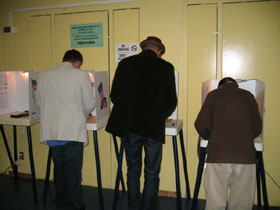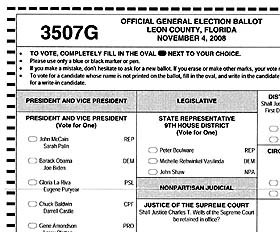Absentee Voting
 |
Alan Clark, English-language editor, Embassy Tokyo. Came to Japan in 1996 and has worked as a Japanese-to-English translator since 2000. Began work in the Embassy Press Office in 2005. |
What if you are going to be orbiting the earth on Election Day? Can you still vote? What if you will be on a business trip to Mexico? Or studying in France? Or volunteering at an aid project in Africa? Even serving on a scientific mission to Antarctica? Ensuring that citizens can exercise their right to vote is essential to the proper functioning of a democracy. In both Japan and the United States, systems to allow absentee voting are being developed toward that goal.
Over the past several years, Japan has changed its election law to allow citizens age 20 and older who have lived in a foreign country for more than three months to vote in this way. Due to Japan's system of resident registry, overseas voters were initially only allowed to vote in the proportional-representation segment of Diet elections. A revision in 2006, however, gave overseas citizens the right to vote in electoral districts, as well, and this system was fully implemented for the first time in the 2007 Upper House election. According to Japan's Ministry of Foreign Affairs, while there are 798,000 eligible voters overseas, just over 100,000 have registered with their nearest embassy to vote. A separate law enacted in 2006 gave members of the Self-Defense Forces stationed abroad the right to vote in national and local elections. In the case of the SDF, temporary voting booths are set up in an SDF camp, and any members assigned to Antarctica can fax their ballot to Japan. (The MSDF has long taken part in annual three-month observation missions in and around the world's southernmost continent.)
 |
With the absentee voting system, citizens can vote by mail. |
In the United States, absentee voting has grown over time to be a commonly accepted feature of political life. The first widespread, but mostly symbolic, use of absentee ballots in the U.S. took place during the Civil War (1861-1865), as Union soldiers in the field were allowed to vote in federal elections on an exceptional basis. Around the turn of the twentieth century, some states began to extend the right of absentee voting to ordinary citizens under limited circumstances, but it was still not widespread. Absentee voting was made permanently available for military personnel during World War II, and in the aftermath of that conflict, state after state introduced it for ordinary citizens to the point that, by the mid-1960s, New Mexico was the only state that did not allow any absentee voting. The actual use of absentee ballots, though, was still comparatively low, accounting for only 2.63% of all votes cast in the general election of 1962 in California. By 2006, however, this figure had grown to an astonishing 41.54%.
What lies behind this increase in the number of people voting by mail? Convenience and mobility. Absentee voting is convenient even for people who would otherwise be in their hometown on Election Day, which is always a Tuesday; voting by mail means that they can go about their daily routine without having to make time to wait in line at a polling place. On top of that, Americans are moving abroad more than ever before, with an estimated 6 million citizens living overseas. While laws and rules concerning voting are generally handled at the state level, the federal government guaranteed all U.S. citizens overseas the right to vote in federal elections with its passage in 1986 of the Uniformed and Overseas Citizens Absentee Voting Act.
 |
Example absentee ballot for the 2008 election. |
The United States has also created the Federal Voting Assistance Program (FVAP), an organ of the Department of Defense, to educate Americans abroad about absentee voting, and Director Pauline Brunelli has traveled around the world to spread the word. Although election laws vary by state, a universal registration form can be downloaded from the FVAP website and then mailed to the citizen's local election office in the U.S. after completion. The citizen will then be mailed a ballot to fill out and return. According to the FVAP, of the approximately 6 million eligible U.S. voters residing abroad, over half cast ballots in the 2004 presidential election.
NASA astronauts are even allowed to vote from space. NASA Commander Leroy Chiao in 2004 became the first person to vote in a U.S. presidential election from space, casting his ballot via a secure email connection at the International Space Station. Chiao explained the importance of this on NASA's website: "A few years ago, the Texas State Legislature passed a bill allowing astronauts to vote from space. Why did they go to so much trouble for just a few people? Because voting is each citizen's most basic, yet most powerful tool for participating in America's cherished right to choose its leaders."
Frank McEvoy, Secretary to the Director for USFJ at Yokota Airbase in Japan, also stressed the importance of citizen participation when American View spoke to him about absentee voting by service members in Japan. "Voting is both a right and responsibility of citizens in our country, and that includes service members," he told us. USFJ actively helps service members exercise their right to vote. McEvoy explains: "We have Voting Assistance Officers who assist members with filling out and mailing the Federal Post Card Application Form (FPCAF), federal write-in absentee ballots, and provide information on registering to vote in national, state, and local elections." According to McEvoy, "Absentee voting for service members isn't really different from how ordinary citizens vote, except for checking a different box on the FPCAF."
We asked McEvoy about voter turnout for the military in general and USFJ in particular. "According to the U.S. Election Assistance Commission, for the off-year election in 2006 there were 119,000 absentee ballots requested for overseas troops (worldwide), and 57,000 were cast. There are no specific numbers for Japan."
U.S. Embassies and Consulates overseas also help citizens to register to vote and to cast absentee ballots in federal and state elections. Embassy Tokyo held a Federal Voting Assistance Program (FVAP) workshop on March 18, where American citizens were trained to serve as Voting Assistance Officers and help their fellow overseas citizens cast ballots. The Embassy Tokyo website also has detailed information on voting for U.S. citizens, and citizens who are not yet registered to vote or who are registered but have not requested an absentee ballot can download a Federal Post Card Application and send it to a local election official in their home state. The Embassy and Consulates will even mail the application back to the U.S. for free. After the application is approved, a local election official will mail him or her an absentee ballot, which can be returned by post. In the event that notarization is needed for any of the voting materials, that service is also provided at Embassies and Consulates free of charge.
In addition to being able to vote by mail, Americans living overseas can be just as active in politics as their fellow citizens back home. Both major parties have global organizations that help Americans living abroad stay engaged in the political process: Democrats Abroad and Republicans Abroad. The local chapters in Japan each claim about 1,000 members. Local chapters in various countries hold meetings to discuss political issues, and they also do things like organize social events and raise money for charitable causes. But while members of the two organizations may disagree on which candidate to support, both organizations focus on helping Americans overseas to vote. As Republicans Abroad Executive Director Cynthia Dillon explains on the America.gov website, "Our primary mission is to make sure Americans overseas register to vote."
During this year's hotly contested presidential primary season, both Democrats and Republicans overseas were eligible to vote in their home state's primary. Members of Democrats Abroad also had the option of forgoing participation in their home state's primary to take part in the global Democrats Abroad primary. Voting in this unique primary took place February 5-12, and more than 23,000 of the organization's members around the world took part, with Barack Obama winning 4.5 delegates to the Democratic National Convention and Hillary Clinton taking 2.5. These Democratic voters were allowed to drop their ballots off at 30 voting centers across the world or cast their votes by post, by fax, and for the first time via a secure website.
In the U.S., individual citizens also play a huge role in financing candidates' presidential campaigns. Corporations are barred from giving money directly to a candidate's campaign, so candidates have to rely on individual donors. Individuals are allowed to donate up to $2,300 to a single candidate, so a candidate running an expensive nationwide campaign for the presidency will need to find ways to bring as many potential supporters into the fold as possible. Traditionally, political fundraising has involved candidates going to speak at high-priced lunches or dinners with supporters. What is new in the 2008 election cycle is that the candidates and their campaigns have been more actively reaching out and soliciting support from Americans who live overseas. Republican presidential candidate Sen. John McCain held a fundraiser in London in March, and Democratic presidential candidate Sen. Barack Obama's wife Michelle attended a fundraiser for her husband in London in October 2007. Obama national security adviser Richard Danzig, meanwhile, spoke at a $250-per-person fundraiser in Tokyo in April, discussing Asia policy with Obama supporters.
According to an analysis of Federal Election Commission records conducted by the Washington Post and carried in the paper on April 22 this year, this unprecedented courtship of U.S. voters abroad has paid tremendous dividends for the candidates. As of the end of February – nine months before the November general election – Americans overseas had already contributed $2.8 million dollars to candidates, more than double the figure for the entire 2004 campaign. Senator Obama accounted for about half of that figure, bringing in $1.4 million dollars from overseas citizens, with Senator Hillary Clinton in second at $556,300. As the Post notes, however, these figures are likely only the tip of the iceberg, as many Americans overseas maintain a home address in the U.S. that ends up on their contributor records, and former President Bill Clinton raised more than $700,000 for Senator Clinton's campaign in just two fund-raising events in Dublin and London in November 2007.
Like their fellow citizens not in uniform, U.S. service members are free to donate money to candidates and take part in campaigns, though there are some restrictions. Secretary to the Director McEvoy explains: "Service members are allowed to donate money to candidates, and they are allowed to volunteer their time, but they cannot be in uniform when volunteering." We asked him how common it was for service members overseas to get involved in political campaigns: "It is more uncommon in an overseas environment. I have not seen or heard of campaign rallies or similar events on military installations." In response to our question about the level of interest in the upcoming presidential election among service members, he said: "Service members have as much interest in the election as the general public, but our interest is more personal, because we are electing our next Commander-in-Chief."
The Internet, meanwhile, has made it easier for candidates to communicate with their supporters around the world. Both the Obama and McCain campaigns actively collect email addresses from supporters and donors and send them regular updates on such things as upcoming appearances by the candidates on TV and at rallies. The social networking website Facebook has also emerged this campaign cycle as a powerful political tool, with Obama leading the way in extending the presidential campaign into this new territory in cyberspace. As of early September, Obama had gotten 1.7 million Facebook users to register as supporters, and McCain, for his part, had over 300,000. Perhaps more significantly, social-networking sites like Facebook allow like-minded people to organize themselves, and two grassroots groups of American Obama supporters in Japan have sprung up with the goal of holding events locally.
The Internet has also helped connect overseas voters to the political process. This election cycle, the nonpartisan Commission on Presidential Debates has teamed up with the social-networking site Myspace to create www.mydebates.org, a portal that allows voters to make "scorecards" of the issues that matter to them, discuss the debates online, and even submit questions that might be asked of the candidates at the town-hall-format debate.
As the campaign goes into the final stretch, Americans both at home and overseas are increasingly turning their attention to politics. A long-term American expatriate in Tokyo we spoke with explained the significance of absentee voting and technological advances: "Technology has really changed things for voters overseas. While I was of course able to vote by mail from Japan in the 1996 presidential election, that was about the extent of my involvement. This time around, by contrast, I've watched the debates on Youtube, have donated money online to the presidential candidate I support, and have taken part in discussions in various online forums. The key to democracy is participation, and overseas voters can now have a much greater sense of involvement. This is important, because our democracy belongs to all Americans, regardless of where we are."
